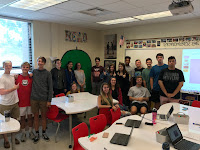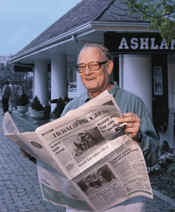There are so many moments in my life that I wish I had embraced differently. More recently this summer, I wrote a letter to several publishers of educational books for an idea of a book I want to write. I've had this idea mapped out in my head for years and finally mustered up enough courage to explain it to various publishers. The thing is, I never mailed the letters. They still rest on my desk at home, fearing rejection, obsessing over the idea that no one could possibly want to read a book written by me. After all, I'm just a public school teacher; what kind of impact could my words have?
I've been thinking a lot about how so many people--myself especially--fail to embrace situations that cause uncertainty. We neglect to embrace the imperfections, the new ideas, the acts of kindness. Maybe it's due to insecurities or the fact that there's not enough time in the day or even that we think it won't make an impact. Yet, I'm not so sure why or what we are afraid of in not embracing moments in our lives. Each year, I choose a word as a goal for the new year. It's a word that anchors me through all aspects of life for that year. This year, I can't stop thinking about the word embrace. It's a simple word, really, that comes with a physical connection at times as well as a positive mental attitude at others.When I went to college at the University of Richmond, I was forced to embrace the idea of fried okra, barbeque, and southern accents along with meeting new people (which was not a small feat for a shy introvert like myself). As a teacher, I've learned that more often than not, my students need an embrace to help them with what they are going through and that sometimes a high five or fist bump or a kind word is just not enough. I even possess a t-shirt thanks to UVA basketball that reads "Embrace the Pace," and love the hugs that I seem to receive every time I'm wearing it.
I've been thinking a lot about this word embrace in my own classroom. In IB English, we began conversations on racism and how it exists in today's world. I know the conversations were not easy and caused some dissension in my classroom. Yet I also know if we don't talk about the problems of our world, how can we change them? If we don't embrace the ideas of others, how can we come to a common understanding? Talking about racism and how it exists in the twenty-first century is one of the bravest and most courageous decisions I have made in my teaching. I'm not talking about discussing the Civil Rights Movement or how racism exists in books like To Kill a Mockingbird. I'm talking about racism that sadly exists in the walls of today's society--in the cafeteria, in the locker room, in the hallways. It's a hard conversation, but it's one I will continue to embrace because it's that important. Thank you, juniors, for the powerful PSAs that resulted from our conversations on racism. Let's continue to embrace the idea of talking deeply and intimately about global issues of significance.
I've also had the opportunity over twenty-one years in the classroom to recognize that classroom teaching goes far beyond what's in a textbook. A few years ago, I noticed the need for more kindness in my classroom and decided to stop teaching for the day to address the problem. As a teacher, it was one of the most unconventional classroom decisions I've made. I know that it might not seem like much, but taking time to do that one simple kindness activity changed the way I understand my role as an educator. This past month, I watched as my Theory of Knowledge students raised money, shopped for, wrapped, and delivered 66 presents for the students at Henry Clay Elementary School in the Head Start Pre-K program. It was a powerful testament of kindness, and I'm grateful for every one of my students who embraced the opportunity--who maybe were not around children much and suddenly had a young child in their lap--who maybe never knew how to wrap a present (there was even a few of you who you tubed that!)--who realized the power and the impact they could make.
In all of my classes, I've also had the opportunity to watch you compliment each other in our first ever compliment tournament. In many classes, I witnessed surprise victories and the power a kind word can have. I know it took courage to say those words publicly, and I also want you to know how much I appreciate you embracing the idea.
And so, this month, I encourage you to think about the word embrace. Maybe it's to embrace going to a college that you didn't think you'd attend. Maybe it's to embrace your friends and everything Atlee has to offer in your final semester at Atlee as seniors instead of wishing the time away. Maybe it's to continue to make strides at breaking down barriers as we continue to listen to one another in classroom discussions.
For me, here's what the word embrace means in the new year. I will embrace new ideas and situations I'm not sure of. That means trying something new in my classroom because I know it will benefit you. It means reaching out to that person I know needs my help even though I'm unsure of his/her reaction. It means continuing to practice true acts of kindness. It means to really send those letters to those publishers. My goal as I enter 2020 is to embrace who I am and all of my imperfections. My goal is to embrace situations I would typically shy away from, to make no apologies. My goal is to make an impact--today--so that hindsight is no longer 20/20 but something of 2019.
It takes light 4 years to reach the Earth from Sirius, a neighboring star. I'm not sure what made me research that fact this month, but it's fascinating that the light we see takes so long to make an impact on us. It made me think of all of the missed opportunities in life that sometimes force us to not make an impact or that take longer than they should for us to see. What if we chose not to embrace situations for long amounts of time because we were afraid or lazy or unsure? What if we were so focused on our insecurities or complaints that we take too long to make an impact--to be the neighboring star that sheds a light on Earth? My goal at the start of 2020 is not to decline the walk but to be the light, to make the impact, to embrace the journey.


















































